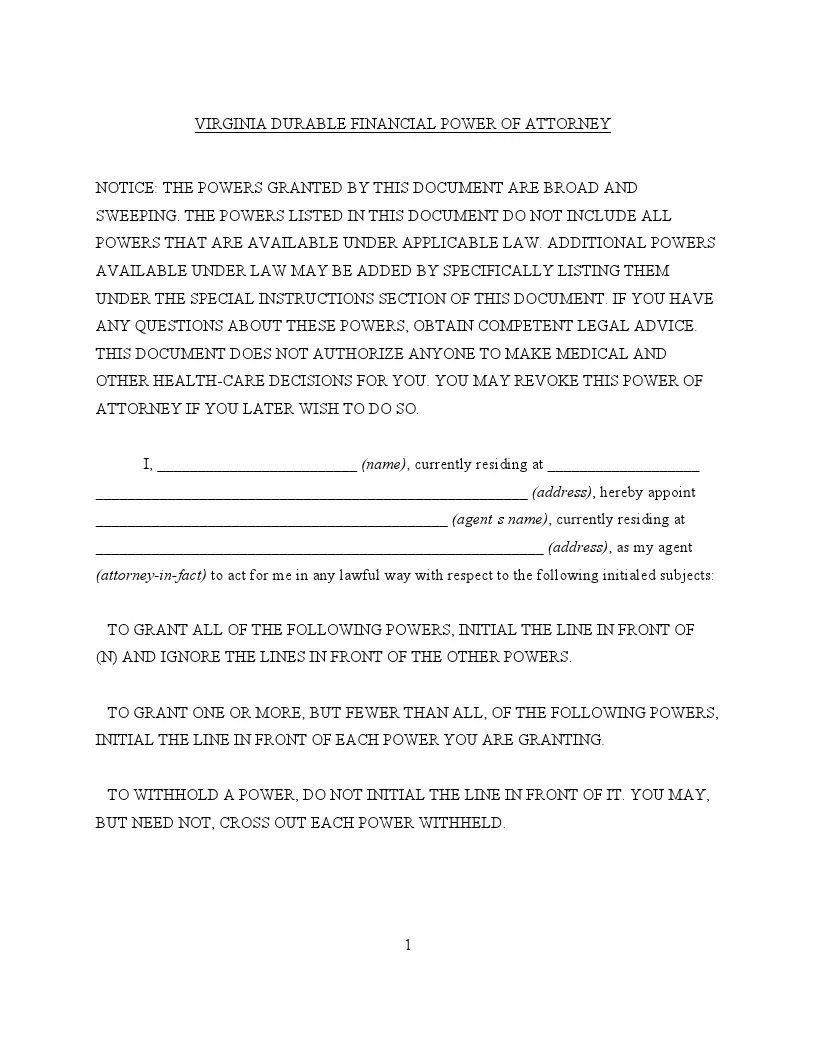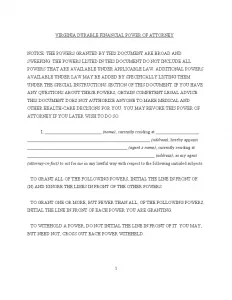Free Virginia Durable Power of Attorney Form
The Virginia durable power of attorney form is a kind of document that is needed if a person wants someone else to take care of their matters. In this case, financial matters specifically. The person who creates the durable power of attorney form and delegates the powers is called “the principal” in Virginia and many other states. The person who the principal assigns the powers to is called “agent” but can also be called otherwise, and very often is called “attorney-in-fact.” The principal may assign one or more agents. In that case, the other terms could be used, such as “coagent” or “successor agent.”
Virginia power of attorney forms – visit to get more Virginia-specific power of attorney documents that you may need.

Build Your Document
Answer a few simple questions to make your document in minutes
Save and Print
Save progress and finish on any device, download and print anytime
Sign and Use
Your valid, lawyer-approved document is ready
When the power of attorney is called “durable,” it retains its power even after the principal becomes incapacitated. In the laws of Virginia, a person may be called incapacitated in the following cases defined by the Code of Virginia (§64.2-1600):
- If they have an impairment that prevents them from receiving and evaluating information or from making and communicating decisions;
- If they are missing or outside of the country and unable to come back.
If the principal does not want a power of attorney to be durable, they need to explicitly state in the form that a power of attorney will be terminated when they become incapacitated. A durable power of attorney is especially useful when you have an estate plan or if you want somebody you trust to help your family in financial matters in case you become incapacitated.
If you want a power of attorney to come into effect later, you should also explicitly state so. Otherwise, it will become effective immediately.
Virginia Signing Requirements and Laws
The principal must sign a power of attorney themselves, or someone else can do it in their presence but only if the principal is conscious and directs them. A notary public, or another person who is authorized to acknowledge signatures, acknowledges the signature in Virginia state.
Many different powers that could be included in the form. You do not need to provide all of them to the attorney-in-fact. You can choose the ones that you will assign to them from a list. In the state of Virginia, the powers typically assigned to agents relate to the following matters:
- Real estate
- Personal property
- Baking
- Safe-deposit box
- Lending and borrowing
- Benefits
- Retirement plans
- Tax matters
- Insurance
- Gifts
In a typical power of attorney form for Virginia’s state, the principal initials the boxes that correspond to the powers that they delegate to the agent. Always think carefully whether you want to delegate all of the above to them, or if there are just specific matters you need them to take care of for you.
Remember that this power of attorney form does not provide the agent with any rights to make decisions that have to do with health-related matters. These decisions are usually covered in a different type of document, often called a general power of attorney form.
Virginia Durable Power of Attorney Form Details
| Document Name | Virginia Durable Power of Attorney Form |
| Other Names | Virginia Financial Durable Power of Attorney, VA DPOA |
| Relevant Laws | Virginia Code, Sections 64.2-1600 to 64.2-1642 |
| Signing Requirements | Notary Public |
| Avg. Time to Fill Out | 10 minutes |
| # of Fillable Fields | 37 |
| Available Formats | Adobe PDF |
Popular Local Durable POA Forms
Durable POA forms are used in each and every state. Check out some other popular DPOA forms often searched for by people.
Steps to Complete the Form
To start filling out the form, use our form building software for the easiest and fastest process. You will need to complete the following steps:
- State your name and address.
First of all, the principal has to state their name and provide their address, including the state.

- Name your attorney-in-fact.
The principal has to provide the name and the address of the person they designate the powers to (named “the attorney-in-fact” throughout the form).

- Decide when the form will become effective.
In the next section, you need to decide if you want a power of attorney to become effective immediately or if you want a power of attorney to become effective only in certain circumstances, such as when you are determined to be incapacitated.
Here you can define if you want a power of attorney to be durable or not. Remember that if you do not want the attorney-in-fact to have powers when you are incapacitated, you need to state so explicitly.

- Define the powers delegated to your attorney-in-fact.
Initial the boxes, referring to specific powers that you want the agent to have. We have provided a list of typically included matters above but read each line carefully in the form before putting your initials next to it.

- Provide special instructions.
If you have additional instructions, or if you want to somehow limit or extend the powers of the attorney-in-fact, you can do it in the appropriate box.

- State the date.
Provide the date of the signing.

- Sign the form.
The principal has to sign a power of attorney.

- Ask the witnesses to sign the form.
Two witnesses may sign the form. They need to provide their names and addresses.
- Complete the form with the signature of a notary public.
Virginia laws require an acknowledgment from a notary public to create a power of attorney.


Interested in other Virginia templates? We offer free templates and a straightforward personalization experience to everyone who prefers less hassle when dealing with paperwork.
Download a Free Virginia Durable Power of Attorney Form
